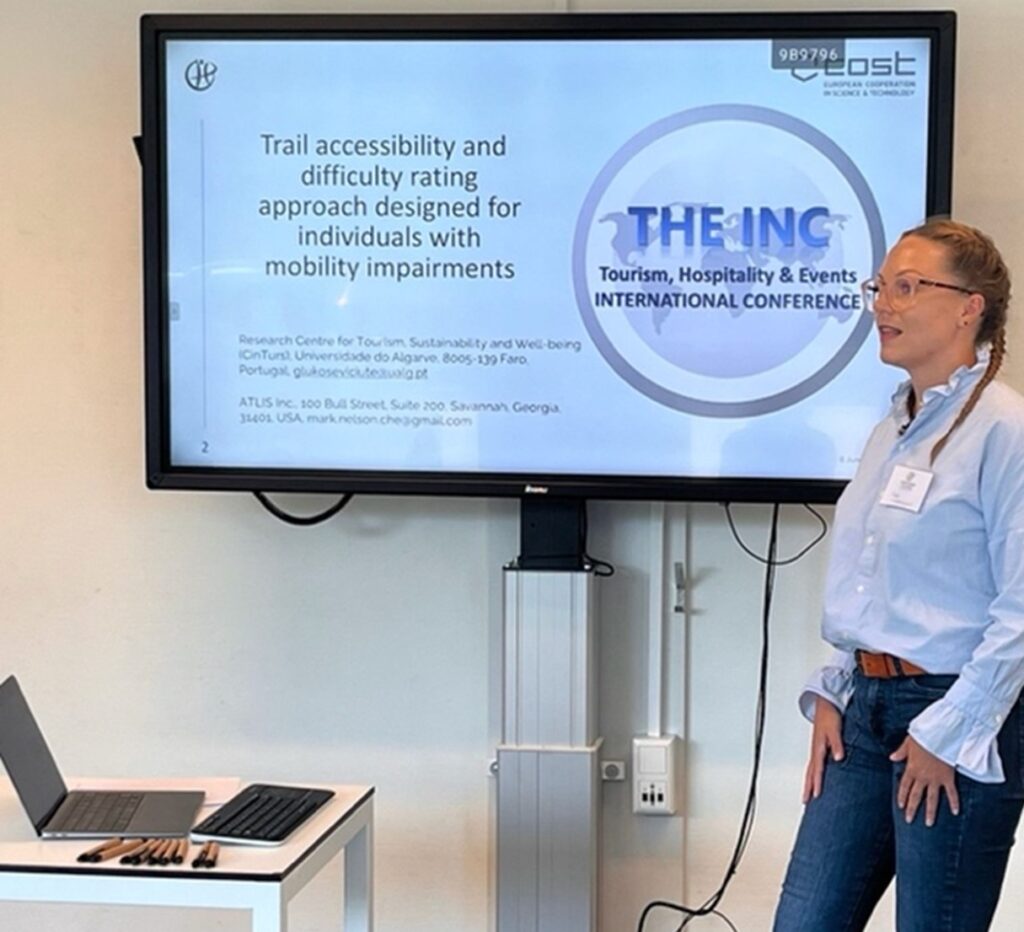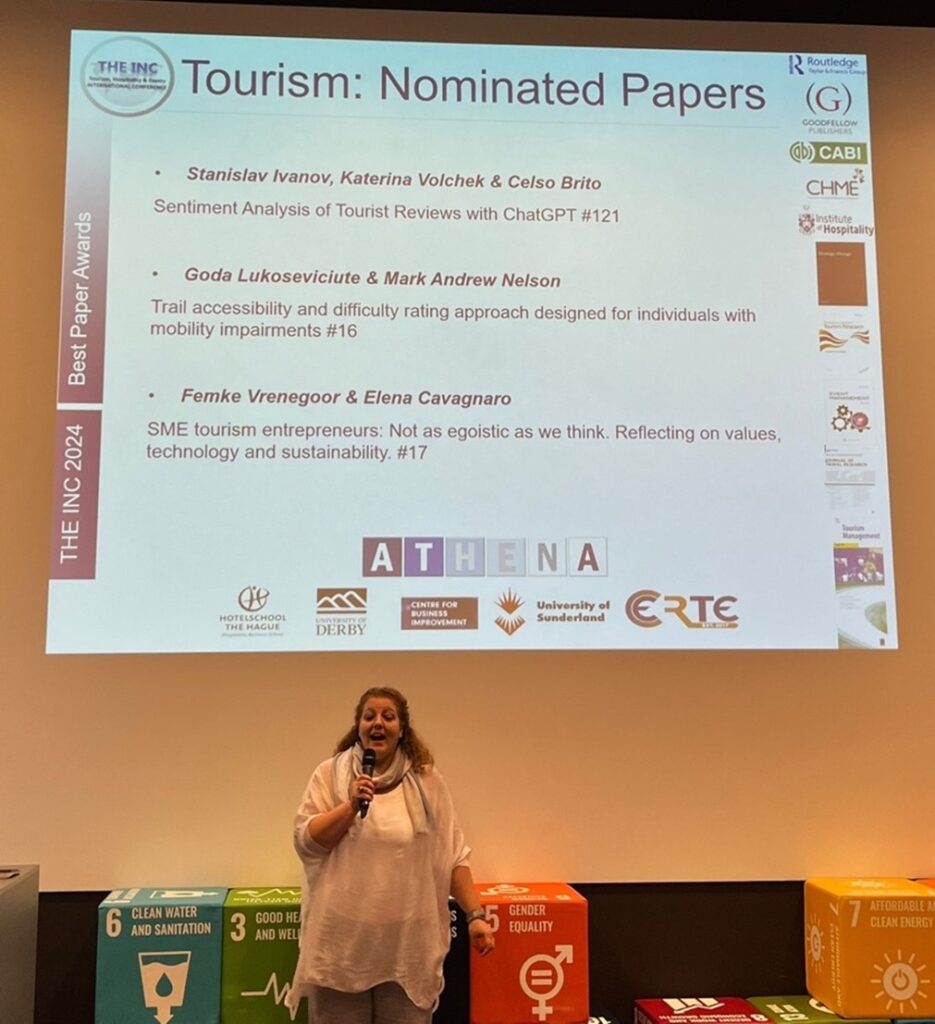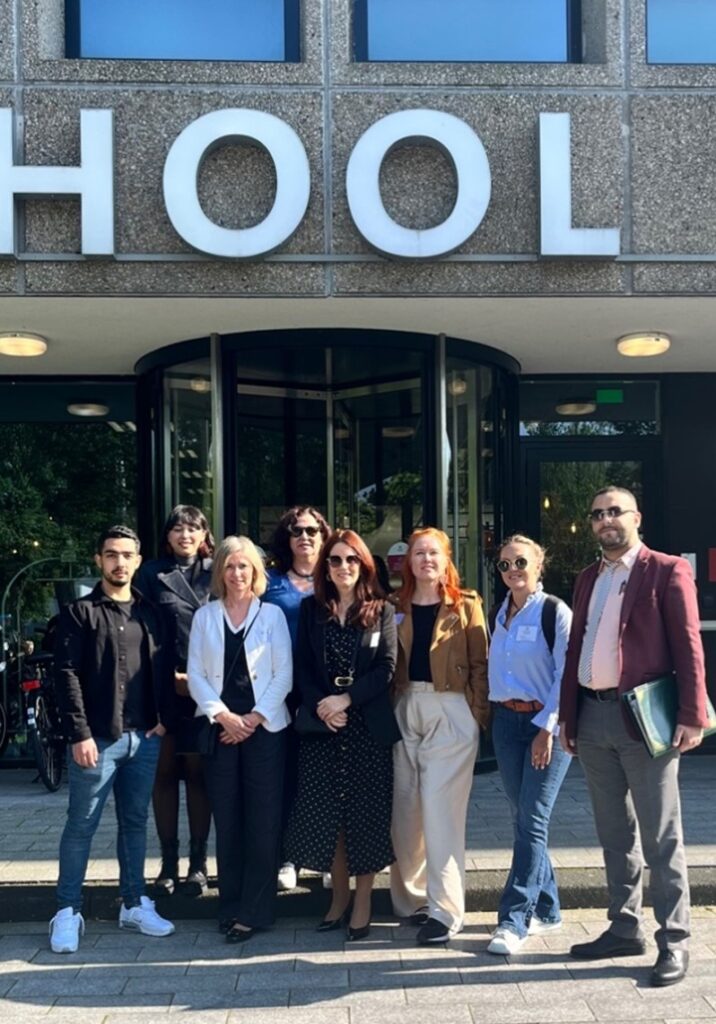By Goda Lukoseviciute (University of Algarve)
In June, MARGISTAR member Goda Lukoseviciute attended the Tourism Hospitality & Events International Conference (THE INC) in Amsterdam, the Netherlands. The conference focused on professional collaboration to understand and develop scientific ideas in tourism. Hosted by Hotelschool the Hague, THE INC 2024 provided Goda the opportunity to present her research, interact with professionals, and discuss future opportunities in her research interests. Continue reading to learn how the conference impacted Goda and the insights she took from her experience.
THE INC 2024 (Tourism, Hospitality & Events International Conference) is the official conference of ATHENA, hosted by the Hotelschool The Hague from June 5-7 2024 in Amsterdam, the Netherlands. THE INC 2024 was co-organised by the Hotelschool The Hague, the Universities of Derby and Sunderland, The Centre for the Promotion of Imports, The Hospitality Research Centre, and The Centre for Research in Tourism Excellence. This year, I was able to attend the conference and represent the Research Centre for Tourism, Sustainability and Well-being (CinTurs) from University of Algarve, Portugal.
THE INC hosts theoretical, empirical, experimental, and case study research contributions that address the theoretical and practical implications of topics including competitiveness, sustainability and corporate social responsibility, smart cities/destinations/tourism/infrastructure, culture, heritage, place-making and storytelling, policy, planning, and governance.
Impressions of THE INC 2024
The theme of THE INC 2024 was “Technology Enabled Competitiveness and Experiences in Tourism, Hospitality and Events.” The conference aimed to gather and share knowledge, experience, and expertise, and to support scientific excellence in tourism amongst research centres and institutes internationally. THE INC set a high bar for its research output, hosting four highly esteemed journals, generating special issues, and inviting three key publishers as exhibitors (CABI; Goodfellow Publishers; Routledge).
Among the most notable keynote presenters, the following ones were Professor Dimitrios Buhalis, a Strategic Management and Marketing expert with specialisation in Information Communication Technology applications, Professor Nancy Gard McGehee, specialising in Hospitality and Tourism Management, and Professor Peter O’Connor, whose expertise is in Strategic Management.
Prof. Dimitrios Buhalis presented “Smart Tourism and Ambient Intelligence towards Artificial Intelligence and Metaverse,” providing a vision of how the Metaverse can revolutionise tourism experiences and transform tourism management and marketing. Dimitrios concluded that the Metaverse is emerging as a disruptive future trend that impacts the competitiveness of tourism destinations and organisations. Because global citizens adopt advanced virtual services, they are expected to become more familiar towards digital services, technologies, goods, and the entire digital economy. To the degree that it is affordable, accessible, useable, and offers good experience and value, the Metaverse is likely to be accepted by tech-ready and tech-competent users.
Prof. Nancy Gard McGehee, Editor in Chief of the Journal of Travel Research (JTR), gave her professional perspective on “JTR and Technology Research: Past, Present, Future.” Her speech gave many insights into current trends, how to successfully publish in top-tier journals, and the elements research related to technology application in tourism should have. Concluding her insights, theoretical contributions in the application of technology in tourism is a key demand that allows further theory applications in practice.
Prof. Peter O’Connor gave an insightful presentation on the topic of “The Democratisation of Tourism Distribution: Leveraging new technological developments to battle mega-brands and online intermediaries.” Peter concluded that, with informal organisation structures, little managerial or technical training, and an ingrained reluctance to change, small and medium tourism enterprise (SMTE) managers remain unfamiliar with the possibilities offered by democratised technologies. While this challenge could be addressed by awareness building and training, it is likely that more substantial progress will arise from generational change in SMTE management with digitally native successors who are more likely to exploit developments to improve competitiveness and performance.
Why attend THE INC 2024?
My main reasons for attending THE INC 2024 were:
- To establish relationships with other professionals studying sustainable tourism in rural mountainous areas in order to enable future collaborations, which is a method of sustainable development matching MARGISTAR goals.
- To present my research paper entitled “Trail accessibility and difficulty rating approach designed for individuals with mobility.” This research presents trail difficulty rating system utilizing latest technology to facilitate trail accreditation to help market trail (for mobility impaired or general users) and increase tourism revenue in rural areas, including mountainous and remote ones. It is a pathway directly related to one of the MARGISTAR goals answering to the question of how to transform marginalized mountainous areas to a green future. The proposed trail difficulty rating system via technology application is a crucial pathway providing more information via digital platforms to potential trail users and successful trail-related recreation development in mountainous areas.

Because the conference attracts people who are interesting for my research goals, my personal expectations were to present research and to network and interact with distinguished scholars, academics, and business professionals. Out of 100 papers, my research paper was nominated among three others as the best research paper in the field of tourism. Although it was not the winner, this nomination was an important acknowledgment for me and the research I conduct. All nominated research was peer-reviewed and accepted for publication in the special issue of the International Journal of Tourism Research, dedicated to the conference.

A second key motivation was meeting with Dutch researchers from the Hotelschool The Hague in relation to a new COST Action proposal and its submission by the end of October 2024. Active and continuous communication with the research team has been maintained after the conference and is one of the most important personal outputs of the attendance of THE INC 2024.

The presentations at the conference were insightful for my field of interest, outdoor recreation, and sustainable territorial development. The main message I took away is that technology has the potential to revolutionise outdoor recreation by enhancing user experiences, increasing safety and accessibility, promoting environmental conservation, boosting marketing and economic impacts, as well as fostering social and community engagement. It is therefore crucial to adapt technology use in outdoor recreation development and management and train stakeholders on how to use and benefit from them.
My time at THE INC 2024 had a significant influence on my professional career and expanded my research interests. This conference participation was a defining moment in my academic career because of the collaborative opportunities it provided. Overall, this was a crucial experience for me as an early career investigator.


